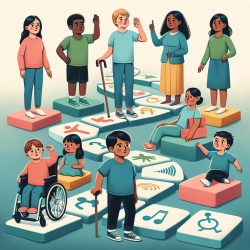Introduction
In the realm of speech-language pathology, data-driven decisions are paramount. As practitioners, we are constantly seeking innovative methods to enhance our services, particularly when it comes to handling sensitive information. The research article titled "A Privacy-preserving Distributed Filtering Framework for NLP Artifacts" presents a groundbreaking approach that can significantly improve the way we manage clinical data. This blog explores the key findings of the research and how they can be applied to enhance outcomes for children receiving online therapy services.
The Challenge of Data Privacy
Medical data sharing is a crucial component of collaborative research, yet privacy concerns often impede progress. Clinical notes, rich with unstructured data, pose a unique challenge for de-identification. Traditional methods of scrubbing sensitive information are fraught with errors and inefficiencies. This research introduces a novel framework that leverages homomorphic encryption to securely filter NLP artifacts, ensuring both privacy and data utility.
Key Findings and Applications
The study outlines a secure protocol based on private set intersection and secure thresholding. This protocol identifies low-frequency bigrams that may contain sensitive information, guiding the removal of potentially compromising sentences from clinical notes. The framework is designed to be scalable and generalizable, applicable to various NLP artifacts beyond bigrams.
Practical Implications for Practitioners
For practitioners in speech-language pathology, the implications are profound:
- Enhanced Privacy: By utilizing this framework, practitioners can confidently share de-identified clinical data for research without compromising patient privacy.
- Improved Data Utility: The method retains sufficient information for data analysis, ensuring that the insights drawn from clinical notes remain robust and actionable.
- Scalability: The framework's ability to handle data from multiple sources makes it ideal for large-scale collaborative research projects.
Encouraging Further Research
This study is a stepping stone towards more secure and efficient data handling practices. Practitioners are encouraged to delve deeper into the research and consider how these findings can be integrated into their workflows. By embracing these advancements, we can enhance the quality of care provided to children and contribute to the broader field of medical research.
Conclusion
The A privacy-preserving distributed filtering framework for NLP artifacts offers a promising solution to the challenges of data privacy in clinical settings. By adopting this framework, practitioners can ensure that they are at the forefront of data security and patient care.
To read the original research paper, please follow this link: A privacy-preserving distributed filtering framework for NLP artifacts.










